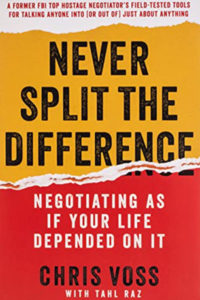Negotiation Skills For Business With Chris Voss

Negotiation Skills For Business With Chris Voss
You can’t avoid negotiations in any line of work, especially in business. Whether it’s negotiating a business deal or negotiating your salary, you need to know how it works. You need to know how many questions you need to ask, how to get in their head, and more. Join Dr. Diane Hamilton as she talks to the CEO of The Black Swan Group and the author of Never Split the Difference, Chris Voss. Learn what Chris teaches his students when talking about business negotiation. Discover why labeling is better than asking questions and how you can unlock the barriers of someone’s brain. Develop some negotiating skills today!

I am here with Chris Voss, who’s the author of the national bestseller, Never Split the Difference: Negotiating As If Your Life Depended On It. He’s a Keynote Speaker, Negotiation Consultant, and Award-Winning Business School Professor. After many years as a lead FBI hostage negotiator, Chris founded The Black Swan Group, a firm that solves business communication problems with hostage negotiation strategies.
Watch the episode here
Listen to the podcast here
Negotiation Skills For Business With Chris Voss
He has used his years of experience in international crises and high-stakes negotiations to develop a unique program and team that applies these globally proven techniques to the business world. Chris teaches Business Negotiation in the MBA program as an adjunct professor at the University of Southern California. He also teaches at Georgetown University. It’s so nice to have you here, Chris.
Thank you very much. It’s my pleasure to be with you.
I have to admit, you’re the first one I’ve ever talked to who has been a hostage negotiator. Kidnapping and all that for the FBI must have been wow. How did you get into that?
I couldn’t sing or dance.
There you go. End of story.
It’s like everything else in life. It’s one left turn after another. It was more because some of the best things in my life have happened to me as a result of bad things. I tore up my knee when I was in college. That limited the amount of time I could be on the SWAT team. I was on the SWAT team with the FBI in Pittsburgh.
I re-injured the knee, and then I realized that they could only put it back together so many. I knew we had hostage negotiators because they went out with the SWAT guys. I don’t know what they did but I figured, “How hard could it be? You talk to people.” It ended up being so much more interesting, and I got to do so much more than I ever could have as a SWAT guy. That was fantastic.
How hard was it?
There’s a lot to it, making it look easy. I’m often reminded of like you listen to a great radio host, a great talk show host like Ryan Seacrest. It’s a classic example.
I thought you were going to say Diane Hamilton, but go ahead.
There are many people out there trying it, doing a horrible job. The people that are good at it make it look effortless. It’s not easy getting to that point. You can do it if you put in the time. The hard thing is you’re willing to put in the time and learn.
I would be fascinated to watch you watch a movie where they have hostage negotiating going on. Is it pretty close to reality or are you going, “Oh please?”
Most of it is pretty bad, but the Negotiator with Samuel Jackson and Kevin Spacey except for a few critical moments. We used to use portions of that when we were teaching hostage negotiations, so that’s a pretty good film.
That’s good to know. Did you have the megaphone and the ‘put your gun’ down type? Is that how it is? Do people want to talk to you, and do you give them the phones? I’m curious about this part before we go on to what you do now. It fascinates me.
You want to get them on the phone as quickly as you can. A megaphone is a bad thing because it’s hard to sound reassuring over a megaphone, but you can do it. You get them on the phone as quickly as you can and diagnose the situation and apply the right Jedi matrix.
You must handle stress very well. These are very stressful jobs. Have you always been able to handle stress well?
I think everybody handles different forms of stress well. It depends upon if you think you’ve got a process that can handle things as well as they could be handled. Any time that I felt like I had a good process, which the whole strategy from hosting negotiation into business is a great process. It’s remarkable knowing not only that you guaranteed success, but that you guaranteed your best chance of success.
[bctt tweet=”Everybody handles different forms of stress really well. You just need a process of how to handle things.” via=”no”]What was your most famous success case? Do you have any that we would recognize?
The old saying, if it leads, it bleeds, or if it bleeds, it leads. If we were successful, you’d hear about it. One that we were behind the scenes on that I got a big kick out of at the time, there’s a Fox News reporter named Steve Santini that got grabbed in a strip probably at about 2005-ish. He and his cameramen literally vanished. The strip is a small contained environment. The initial feedback was that the guys were dead because you can’t make people vanish.
We coached negotiations in that, and once they got started, they initially got started bad. The people we’re coaching said, “No, say this instead. This is more.” I knew that the bad guys, as soon as they knew that there was somebody that knew what they were doing on the other side, we came to a deal very quickly, and Santini and his cameraman got out fast.
When you come to deals by not splitting the difference, what do you mean by Never Split The Difference in the title of your book?
If we were going to split the difference between the journalist and his camera, we’ll take the journalist and you keep the cameraman. You keep the tall, skinny one. We’ll get the short everyone.
I can’t even imagine what you’d even negotiate with that, but I’m curious, in the business world, you help people negotiate with contracts. What are you helping them negotiate?
Splitting the difference is always a bad idea. People need to get that in their head. You should be open to the idea. It’s what most people view as a compromise. Splitting the difference is not the same as a high-value trade. Understanding what you’re trading for and be open to the idea that the other side might be completely right. Invest in your objective and not in your ego.

I like that. How do they know if their ego is getting the best of them? What are the best and the worst trades that you’ve seen that were based on, either having ego get in the way or not get in the way?
There were two companies that merged. I was told about this merger behind the scenes. In the industry they were in, one was very traditional and one was a new rising star company. Through the course of the merger, they also had the opportunity to buy a building because they wanted a state-of-the-art learning facility. They were considering a new headquarters because their old headquarters was old.
They got the opportunity to buy an $800 million building for $200 million. It was this phenomenal facility that was state-of-the-art. He was going to remain the CEO in the merger. He said, “The optics here are bad. If we move into this building and use it as our headquarters, we’re going to look to our clientele, to our customers, as if we’re being lavish on ourselves. It’s going to make us look bad.”
The CEO of the rising star company was going to be the number two in the new version. He said, “You’ve got to be kidding me. We’re going to save $600 million. We’re going to solve two problems simultaneously and save $600 million. Are you kidding me?” What did they do? They split the difference. Since it was a deal they couldn’t pass up, they went ahead and bought the building but they only moved their new learning facility into it.
They cape the headquarters at the old building, which was old for optical reasons. Consequently, spending far is literally blowing millions of dollars because of their fear of the optics. Not only are they wasting tons of money, but the number two guy is still so mad at the massive waste of money that he’s going to end up leaving the company, and it takes some of his executives with him. They’re going to lose a lot of their leadership over the traditional CEO’s ego over optics.
What would you have advised them? Doesn’t there have to be somebody that doesn’t get what they want?
We’re recalibrating what’s in people’s heads. You take what’s in somebody’s head and that’s the entire purpose of tactical empathy. I need to know what your perception is. First of all, I got to get out of you, what’s in your head and what you’re most afraid of. We’re more driven by fear than we are driven by gain. In many cases, as a cliché that everybody hates but it’s true, is perception is reality.
First, I’ve got to know what your perception is, then I’ve got to know what the comparisons you’re making on your head. Chances are, if you’re doing something that makes no sense, the comparison in your head needs to change. Now, you’re not going to let me change that if you feel attacked and argued with because you’re only going to dig in deeper and you’re only going to get matter. You’re going to lose sight of what the real objective was because the real objective is what’s best for our company.
[bctt tweet=”Perception is reality. If you’re doing something that makes no sense, the comparison in your head needs to change.” via=”no”]Was there a point in time, we appear to be a very traditional company now because we’ve been here for a long time. The company was probably originally built based on that they were cutting edge innovative company when you were first created. Have you forgotten that at one point in time, you were cutting-edge innovative company?
If that image was good for you then, what makes it bad for you now? You get to the comparisons in people’s heads then you ask, there’s great power and deference. You get people to think by asking them questions deferentially. You say, “What happened to our branding that made being innovative and cutting-edge a bad thing?”
That’s so interesting. I’m going back to your tactical empathy. I wrote my dissertation, emotional intelligence and empathy are a big part of that. You’re putting yourself in someone else’s position and I find this all very fascinating. I’m curious, you’re pretty much working on having them review their thought process of how they view things. Do you also give in to anything or you never split the difference you don’t give in at all?
I got to be open to be persuaded also. You may in fact have a better idea than me. I might be the one who’s seen it wrong. If I can dig into your thought pattern, maybe what you’re driving is a better idea than mine. You’re just having trouble articulating it effectively.
How do you dig into that thought pattern?
I’ll shift gears but hopefully, it’s analogous. Negotiation between a husband and a wife over a Christmas tree. Husband wants an artificial tree and wife wants a real tree. Husband’s got all sorts of practical reasons for the artificial tree. “We know what it looks like. We buy it once. We never have to buy it again. It doesn’t catch on fire. When we take it down, put it up, it doesn’t leave needles everywhere. There’s no danger here. We have pets. The cat’s not going to climb in an artificial tree. The dog’s not going to mark an artificial tree.”
The wife’s not hearing all logical, rational points. She says, “No.” Whatever’s driving her, maybe it’s deeper into a psyche, so use something that’s what we refer to as a label. A label is better than a question for gathering information. This tool that we refer to as a label. One of our clients in real estate refers to it as unlocking the floodgates of truth-telling. You’ve got to tap right into the stream of consciousness in somebody else’s brain, and remove the barriers and get them to articulate what’s going on in there.
He uses a label. He’s thinking, “This must be something in the hidden or blind quadrants.” He says, “Maybe it had something to do with childhood.” He says to her, “It seems like you had real trees growing up.” She goes, “Yes, I did. The memories of the smell of a real tree with my brothers and sisters, and the great family memories I have that are triggered. The great feelings that are triggered and the closeness that’s triggered by the smell of a tree. I want the same stuff for our children.” At that point in time, he said, “Let’s get a real tree.”
It didn’t go that way at my house. I’ve got a fake tree now. My husband was a better negotiator, apparently. That’s interesting because I ended up liking this fake tree now, but I see what you’re saying, that you have to see what’s behind what it is that’s making them hold their ground. If you don’t ask questions, you’re never going to get there. Isn’t the question asking the first step?
Let’s draw a line because you ask questions to gather information. Asking questions might not be the best way to gather information. In a lot of circumstances, it’s one of the least efficient ways.
Why is that?
You ask a question, and there’s a part of my brain that goes, “You’re trying to pull information.” Some questions are definitely trick-oriented. We believe the planet splits up evenly into thirds regardless of gender ethnicity. It has to do with the wiring of our amygdala and the limbic system, which everybody has. The cave membrane.

One of those types is what we refer to as the analytical type. The analyst doesn’t like to answer a question until they’ve thought it through from all angles and the implications of all their answers. Which means it’s hard to get a good answer out of an analyst in less than two days and they probably want two weeks.
We all know people are like that. We’ve found that the analysts will respond almost instantly in the moment to a label because there’s something about the way the label hits the brain that it doesn’t cause an analyst to immediately go into analytical mode and has attempt much higher percentage of time when they start giving you download of their thoughts.
Give me an example there. I’m curious what you mean.
Let’s go back to the real estate example. They got people walking through open houses in real estate. The commodity happens to be the house here. You’ve got customers and clients that happen to be buyers. You’ve got real estate agents there that are watching their buyers peruse the inventory. They’re the same way as shoe salesman and Macy’s going to watch your clothing salesman. Nordstrom’s going to watch you. Any seller that has a buyer looking at the commodity.
The agents have found that after a buyer walks through and they say, “What do you think?” It’s a good open-ended question, a good calibrated question. Your calibrated open-ended question should start with either the words what or how, if you use them at all. What do you think? It should be a good question. They said, “People say I like it. I’m interested in this. We’ll get back to you.”
Instead, if they say, “Seems like you saw some stuff that interested you.” People will go, “I saw this and I saw that. We’re thinking about this and we’re thinking about our kids. We’re thinking about where we want to be five years from now.” That’s why this agent said a label unlocks the floodgate of truth-telling. That’s a very specifically designed statement that the genius of the design is in its simplicity.
[bctt tweet=”A label unlocks the floodgates of truth-telling.” via=”no”]You’d get negative comments if you directed it the other way. Was there anything you saw wrong with this thing?
Sometimes mislabeling stuff where we’re trying to intentionally trigger, that unlocks a different set of floodgates.
You use all these techniques, and I was looking at some of your client results. You’ve saved a major hospital and a deal that went $200,000. On one deal, you save somebody else $100,000 in this deal, somebody increased profit by $2 million here. How long does your process take when you work with somebody to get these results?
It depends upon how much you possess one or two of two critical traits. One is openness. How coachable are you? How open you are to learning? Number two is, are you willing to do the work? I’ve run across people that are very good negotiators who weren’t particularly open but they were hard workers. They stayed at it till they got it.
The skills fall into three categories. If you’re good at asking questions, then you pick up the idea that you should be getting triggering noes instead of yeses. Some people get that nearly instantaneously. There are some people, first and best way to say no to someone is, how am I supposed to do that? There are some people that pick that up nearly instantaneously. They immediately get to them.
Now, they have a little more trouble with labels. They have a little more trouble with summaries. Some people take to mirroring immediately. There are a couple of skills that you can get by almost only with that skill, and labels and mirrors are pretty close to that. The mirroring is very close to a Jedi mind trick. I’ve got one extremely intelligent client/friend who loves mirroring so much. It’s all he does.
Can you give me an example how he mirrors?
Give you an example?
You’re saying you teach him how to say or do certain things, and he’s able to mimic. Is that what you’ve taught him? What do you mean by mirrors?
I just mirrored you.
I’ve got to think of what I said.
You said, “Can you give me an example?” I could have done 1 or 2 things. I could have simply given you an example. I could have said, “What do you mean by example?” Which would have gotten a fairly limited response. I could have said, “Give me an example,” then you went ahead and gave me 3 or 4 more sentences, and voluntarily so invisibly, you didn’t even know you did.
You tricked me. I like that. This is interesting. When you say that people don’t want to do the work. Maybe they can do certain things but one of the things that’s hard for them is to do the work. What is the work?
It’s mostly repetition of the skills. The barrier to learning is not complexity. The barrier to learning is awkwardness. If the skill feels awkward, then they imagine the other person screaming at them going, “That’s a host. Negotiation skills I saw them. Negotiated with Kevin Spacey, don’t ever do that to me again.”
[bctt tweet=”The barrier to learning is not complexity. It’s awkwardness.” via=”no”]It’s like being with a psychologist. You think they’re always psychoanalyzing you. Is it?
Yes. People get nervous here that that person is going to burst in a flame.
I hate it when that happens.
The fire alarms go off. They call the fire department.
What was your background? Do you have a psychology-based training background or do they teach you that in the FBI? I’m curious where you got these skills.
I am a small-town boy from Iowa. I barely got my undergraduate degree because I thought college was an excuse to join a fraternity.
Your degree was in what?
At the time, it was Iowa State University. They called it Industrial Administration, which evolved into their school of business there. It was a Business degree.
You teach business courses now, correct? I’m curious what courses?
Negotiations.
This is part of the MBA program that they have?
I have been teaching in the MBA programs at Georgetown University and USC, University of Southern California, for those of you in the Southeast. Not the University of South Carolina.
Do you get students up in class have to demonstrate? I would imagine.
I make them. They don’t have a choice. I take them hostage.
That’s great. I bet your course is fun to take. I imagine it fills up. Do you have people that feel uncomfortable? How do you get them over that? The discomfort of having to let somebody into their head a little bit.
Not so much letting somebody into their head but more willing to try this stuff when they have skin in the game. That’s what people are most afraid of. The quieter ones tend to be the better negotiators.
Why is that?
They listen more.
More introverts.
They’re more likely to not put the other side off. Negotiation skills are very similar to sales skills. Daniel Pink wrote a book called To Sell Is Human. The data shows that the best extroverts are not the best salespeople.

I was surprised. I have decades of sales experience, and I remember when it started it to get focus on that, the difference between introverts and extroverts and sales. You tend to think they’re all extroverts and they listen a lot more.
They listen and they think about it in a lot greater depth.
I’m sure you probably read the book, Quiet, by Susan Cain, which I think is an interesting look at the introverts and extroverts. We can learn a lot from our counterparts. If you don’t have certain skills, you can learn them from watching other people. Do you get a lot of introverts or extroverts in your courses? I teach a lot online, so I get a lot of introverts. I’m curious in your courses.
I would say overall, people tend to be a little bit more towards the introverted side. The minority taking a negotiation class, which I’m sure a guy who’s extrovert is going to think, “What do I need to go taking this in school for? I’m great.” It’s an elective. It’s not a required class.
It sounds like a fun class though. Are you an introvert or an extrovert?
I probably lean toward the introverted side. When they can’t quite peg you, some people say situational, “What are you? Are you more of an omnivore?” At the end of the day, I’m not energized with human contact. My former boss in the crisis negotiation unit, Gary Noesner, is dead on introvert. We would teach all day long. He couldn’t wait to go out to some night spot that night to talk to people because talking to people energize him. I teach all day long, and I’d enjoy the heck out of it, but I’d be exhausted at the end of the day.

I’m on where you stand. I come out on the extrovert’s side, but then I need to go home and get over that too. You can get too much for me, but I think what you do is so fascinating. I could see why it would be so helpful to organizations. I can’t remember who introduced us, but I do remember them saying how interesting what you do is. I’m so glad that you were able to be on the show. I hope people read your book, Never Split the Difference: Negotiating As If Your Life Depended On It. Chris Voss, can you let everybody know how they could find out more about you and your book and your work?
The best avenue, the best gateway to everything that we do is a newsletter that we put out once a week called The Edge. It’s free. It’s complimentary. A friend of mine used to say, “If it’s free, I’ll take three.” The best way to subscribe to it is to send a text message, and it’s got to be FBIEmpathy. Don’t let your autocorrect put a space in between FBI and empathy. It’s not case sensitive. Send it to the number 22828.
You get a text in return. They’ll sign you up for the newsletter. It’s the gateway to our website, BlackSwanLTD.com. It tells you about where we’re training in different parts of the country, some stuff on how we can help you individually or as a company. What we have is free. More free stuff. It’s the best gateway to everything that we do to help people make better deals. You can make a lot more money by wasting less time. You don’t necessarily have to take it out of the other side’s hide.
Chris, this was so fascinating. Thank you for being on the show. I enjoyed it.
Important Links
- Never Split the Difference: Negotiating As If Your Life Depended On It
- The Black Swan Group
- To Sell Is Human
- Quiet
About Chris Voss
 Chris Voss is the author of the national best-seller Never Split The Difference, keynote speaker, negotiation consultant, and award-winning business school professor. After 24 years as a lead FBI hostage negotiator, Chris founded The Black Swan Group, a firm that solves business communication problems with hostage negotiation strategies.
Chris Voss is the author of the national best-seller Never Split The Difference, keynote speaker, negotiation consultant, and award-winning business school professor. After 24 years as a lead FBI hostage negotiator, Chris founded The Black Swan Group, a firm that solves business communication problems with hostage negotiation strategies.
Love the show? Subscribe, rate, review, and share!
- DrDianeHamilton.com
- Dr. Diane Hamilton Facebook
- Dr. Diane Hamilton Twitter
- Dr. Diane Hamilton LinkedIn
- Dr. Diane Hamilton YouTube
- Dr. Diane Hamilton Instagram

Teaming Versus Teams with Amy Edmondson and Body Language Secrets Revealed with Greg Williams
Soft Skills: Critical to Employee Success

Attend any leadership conference, and someone likely will bring up startling statistics regarding how employees and leaders lack something they refer to as soft skills. This term is used to describe many qualities that include interpersonal skills, emotional intelligence, and other personality-based issues. The problem that many organizations have experienced is that people are hired for their hard skills, or in other words, for what they know (knowledge). Then later, are often fired for their lack of soft skills, or what they do (behaviors). If employers recognize the importance of soft skills, they can avoid costly hiring and training mistakes, improve turnover, and boost productivity. Continue reading “Soft Skills: Critical to Employee Success”